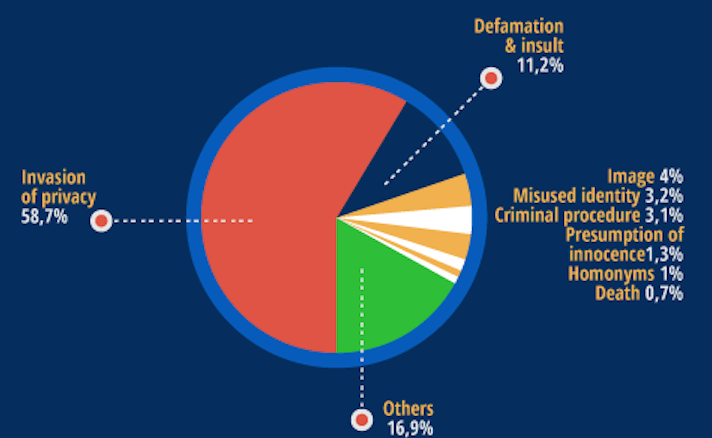Right-To-Be-Forgotten One Year Later: 70 Percent Of Requests Refused
The most often cited reason for RTBF requests is "invasion of privacy."

It was roughly one year ago that the “right to be forgotten” (RTBF) was formally established in Europe by the EU Court of Justice in Luxembourg. Since that time Google has received just over 254,000 removal requests across Europe.
According to Reputation VIP, which operates the Forget.me site in Europe, 70 percent of these RTBF requests are now being denied by Google. The average request processing time has also declined from 56 days to 16 over the past year.

According to the company the top four countries in Europe making RTBF requests are the UK, Germany, The Netherlands and France. Invasion of privacy is by far the most-often cited reason behind RTBF requests. The following chart reflects the full hierarchy of removal justifications, according to Reputation VIP.
Even as RTBF request and removal procedures have “stabilized” over the past year there’s still a raging debate about the scope of removals. Politicians and regulators throughout Europe want the removals to apply to Google’s entire index. To date Google has limited removals to the local, European versions of the company’s index and results and declined to extend them to Google.com.
However as the WSJ explains the dispute could wind up in front of another European court:
The pan-European advisory body that includes all EU privacy regulators issued an opinion last fall that Google should make the removals global, and the head of France’s data-protection regulator says she is willing to issue a formal compliance order against Google if the company doesn’t comply.
As a kind of unacknowledged compromise Google has made it tougher for people in Europe and elsewhere to get to circumvent the local version of Google and instead use Google.com. Google’s official position on this question is that directing and redirecting people to the local version of Google offers a better experience.
Contributing authors are invited to create content for Search Engine Land and are chosen for their expertise and contribution to the search community. Our contributors work under the oversight of the editorial staff and contributions are checked for quality and relevance to our readers. The opinions they express are their own.
Related stories
New on Search Engine Land
